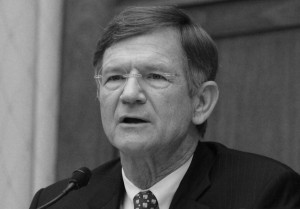Recent congressional inquiries into National Science Foundation (NSF) research funding have provoked criticism from members of the higher education community, including UR Senior Vice President of Research Robert Clark.
U.S. Representative Lamar Smith (R-Texas) recently asked to review the grant proposals of 47 NSF-funded research projects. Smith is Chairman of the House of Representatives’ Committee on Space, Science, and Technology, which has jurisdiction over the NSF.
In April 2013, Smith sent the first of several letters to the NSF asking to review the grant proposals for five research projects.
Since that time, Smith has inquired into more than 40 other research projects, including one at UR. Brain & Cognitive Sciences Professor Benjamin Hayden received NSF funding in June 2013 for his research into the brain’s reward and self-control mechanisms.
The American Association of Universities (AAU) released a statement on Nov. 10 expressing their concerns and highlighting potentially harmful implications of the Committee’s actions. The statement called the requests for NSF grant data “highly inappropriate” and argued that the inquiry “violates the confidentiality guaranteed in the merit review process, thereby discouraging top researchers from participating.”
Another concern surrounding the inquiries has been that Congress is specifically targeting research grants based on their topics, rather than on any inconsistency in the review process. Smith has questioned the importance of social science research in the past, arguing that the NSF’s tax dollars could be better spent on other research. In a post on the Committee’s website, Smith said that “the NSF has funded too many questionable grants at the expense of higher priority research in fields like engineering, mathematics, computer science and biology.”
In a Nov. 5 op-ed for policy news website The Hill, Smith wrote that “funding for social science should not come at the expense of areas of science – math, engineering, computer science, physics, chemistry, and biology – that are most likely to produce breakthroughs that will save lives, create jobs, and promote economic growth. When the NSF only has the funds to approve one out of five requests for grants, research that is in the national interest should be the highest priority.”
Some have interpreted Smith’s actions as politically motivated. The AAU expressed concerns that “the NSF will be pressured to fund only ‘safe’ research that does not attract political attention.” In the same statement, the organization also noted that some of the research grants on Smith’s list were “studies related to climate change or to the study of countries other than the United States.”
Clark expressed similar concerns in a statement on Nov. 12, saying, “Like many others in the scientific community, we are deeply concerned about the nature of these inquiries and the impact they could have on the scientific enterprise. Scientific research awarded through peer-review process should not be subject to political or ideological interference.”
Critics of Smith’s actions have argued that, while it is completely valid for the government to oversee the NSF’s use of taxpayer money, too much Congressional involvement in the NSF’s review process has potential to stifle researchers. UR alumnus Justin Fleming ’13 stated in an interview that, “One of the most dangerous aspects of this congressional review is that it has the potential to sway public opinion away from funding science research.”
“If anything, this issue should raise a red flag about congressional oversight policies when it comes to funding science. Rep. Smith is simply singling out projects for investigation that seem unimportant to him,” Fleming added. “There needs to be a more rigorous congressional review process before the Committee on Science, Space, and Technology can start demanding to see NSF grants.” Fleming works as a lab
technician at the URMC and recently applied for an NSF grant through the organization’s Graduate Research Fellowship Program.
Meanwhile, researchers and University officials have defended the NSF’s current policies. Clark described the review process in his statement, writing that “experienced scientists review [researchers’] proposals and decide which ones are of the highest importance and most merit funding, subject to budget constraints, free from outside interference.”
The AAU’s statement echoed this sentiment, calling the NSF’s record in awarding grants “superb” and adding that “its merit review process is the model for other countries as they try to compete with American science.”
NSF director France A. Córdova allowed the Committee on Space, Science, and Technology to review the grants Smith had requested, although the peer reviewers’ names were removed from all documents to maintain confidentiality. Correspondence between the two, as well as related letters, is available from the Committee on Space, Science, and Technology on its minority website at democrats.science.house.gov.
Dean Clark and Professor Hayden could not comment by press time.
Passanisi is a member of
the class of 2017.

